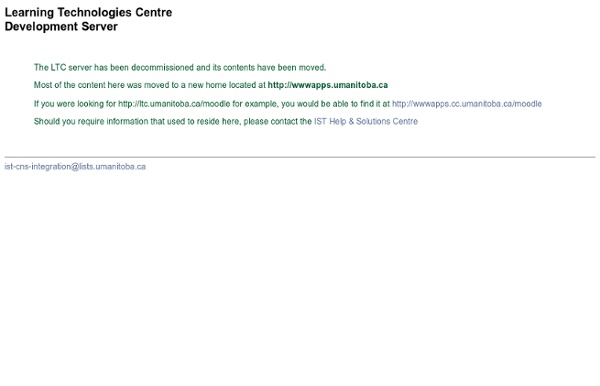



http://ltc.umanitoba.ca/index.html
eduMOOC: Online Learning Today... and Tomorrow Program and Resources Expanding Daily!Visit Often for Updates! The gadget spec URL could not be found The Center for Online Learning, Research and Service at the University of Illinois Springfield welcomes you to a Massive Open Online Class (MOOC) on “Online Learning Today...and Tomorrow.” It will continue through August 19. It is totally open, free, and collaborative. Connectivism Connectivism is a hypothesis of learning which emphasizes the role of social and cultural context. Connectivism is often associated with and proposes a perspective similar to Vygotsky's 'zone of proximal development' (ZPD), an idea later transposed into Engeström's (2001) Activity theory.[1] The relationship between work experience, learning, and knowledge, as expressed in the concept of ‘connectivity, is central to connectivism, motivating the theory's name.[2] It is somewhat similar to Bandura's Social Learning Theory that proposes that people learn through contact. The phrase "a learning theory for the digital age"[3] indicates the emphasis that connectivism gives to technology's effect on how people live, communicate and learn. Nodes and links[edit]
Connectivism and its Critics: What Connectivism Is Not Posted to the CCK08 Blog, September 10, 2008. There are some arguments that argue, essentially, that the model we are demonstrating here would not work in a traditional academic environment. - Lemire - Fitzpatrick - Kashdan These arguments, it seems to me, are circular. Mihaly Csikszentmihalyi Mihaly Csikszentmihalyi (/ˈmiːhaɪ ˌtʃiːksɛntməˈhaɪ.iː/ MEE-hy CHEEK-sent-mə-HY-ee; Hungarian: Csíkszentmihályi Mihály Hungarian: [ˈtʃiːksɛntmihaːji ˈmihaːj] ( ); born (1934-09-29) 29 September 1934 (age 79), in Fiume, Italy – now Rijeka, Croatia, Europe) is a Hungarian psychology professor, who emigrated to the United States at the age of 22. Now at Claremont Graduate University, he is the former head of the department of psychology at the University of Chicago and of the department of sociology and anthropology at Lake Forest College.[citation needed] Work[edit]
Talk:Connectivism wikipedia as a battlefield of views and beliefs?[edit] Of course everyone is entittled to a view on any subject. But describing a subject as an item in an encyclopedia is something different from discussing the content of an item and the validity of a --ism. Not agreeing on connectivism is not a reason for deleting an item on connectivism. 16:35, 6 February 2011 (UTC) — Preceding unsigned comment added by JaapB (talk • contribs) Massive open online course Poster, entitled "MOOC, every letter is negotiable," exploring the meaning of the words "Massive Open Online Course" A Massive Open Online Course (MOOC; /muːk/) is an online course aimed at unlimited participation and open access via the web. In addition to traditional course materials such as videos, readings, and problem sets, MOOCs provide interactive user forums that help build a community for students, professors, and teaching assistants (TAs).
Future-proofing needs collaboration, innovation, education and inspiration Make no mistake, the transformation from a firm of the past to a firm of the future is challenging, especially while operating amid of a perfect storm of social, economic and environmental volatility. Successful transformation requires courage, not fear. The more we understand and explore our own business environments and wider business ecosystems (as well as our own inner motives and values) the more we find pathways for success – learning through doing, growth through experience, success through failure. Looking around us in nature and human nature, we find enablers to assist us; catalysts which aid and optimise the transformational journey. Four primary catalysts for transformation are: collaboration, innovation, education and inspiration. Let's explore each in turn:
PLENK 2010 - The Most Awesome Course on Planet Earth! Over the next nine (9) weeks this post will be continuously littered with my reflections as I learn week-by-week (One mega post, instead of 9-10 small ones! Between 4000-6000 words for sure!), but for now I am too busy engrossed learning and making noise beyond this blog.